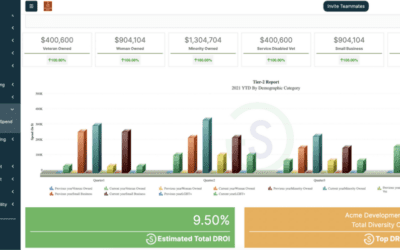Mid-market companies face ongoing supply chain disruptions, with concerns around supplier viability, compliance, and increasing ESG regulations. Procurement technology leaders must identify solutions to monitor, manage, and mitigate supplier risk effectively. This article explains a process for evaluating supplier risk management platforms.
Market Definition
Supplier risk management involves managing risk events that impact the supply chain, including financial, capacity, compliance, ESG, cyber risk, and performance management. Supplier verification and risk management are crucial for maintaining competitive advantage and ensuring business continuity. Technology is key in handling complex data and enhancing risk management capabilities.
Market Trends
Recent global disruptions have highlighted the importance of supply chain resilience. Midmarket companies are looking for verification solutions that help them assess and manage supplier risks, ensuring continuity and reliability in their supply chains. Risk mitigation takes many forms:
- Increased Focus on ESG and Sustainability: Midmarket companies are increasingly required to comply with environmental, social, and governance (ESG) standards. This trend drives the need for supplier verification solutions to assess and monitor suppliers’ ESG compliance and sustainability practices.
- Digital Transformation: The push towards digital transformation is encouraging midmarket companies to adopt more sophisticated supplier verification solutions. These solutions often leverage technologies like AI and machine learning to automate and enhance the verification process, making it more efficient and accurate.
- Cybersecurity Concerns: With the rise in cyber threats, midmarket companies are prioritizing cybersecurity in their supplier verification processes. They need solutions that can evaluate suppliers’ risk profile to mitigate risks associated with data breaches and cyberattacks.
- Regulatory Compliance: Increasing regulatory requirements across various industries prompt midmarket companies to seek supplier verification solutions that ensure compliance with relevant laws and standards, including anti-bribery, anti-money laundering, and labor laws.
- Cost Efficiency and ROI: Midmarket companies are often more cost-sensitive than larger enterprises. They seek supplier verification solutions that offer a good return on investment by providing essential features at a reasonable cost, without unnecessary complexity.
- Supplier Diversity: There is a growing emphasis on supplier diversity, with midmarket companies increasingly looking to engage with minority-owned, women-owned, and other diverse suppliers. Verification solutions that can identify and support diverse suppliers are becoming more important.
- Integration and Interoperability: As midmarket companies adopt various digital tools, there is a need for supplier verification solutions that can easily integrate with existing systems, such as ERP and procurement platforms, to streamline operations and data flow.
These trends are shaping the way midmarket companies approach supplier verification, driving them to seek solutions that are not only effective and compliant but also adaptable to their specific business needs and market conditions.
Priorities and Recommendations
Midmarket companies often have different needs and constraints for supplier verification and risk management solutions than larger enterprises. When evaluating supplier verification solutions, we recommend focusing on core needs.
- The essentials are core features that directly impact your operations, such as basic compliance checks, financial stability assessments, and performance monitoring, rather than the extensive feature sets that enterprises might require.
- Next, prioritize features that help you manage supplier diversity and mitigate risks effectively, aligning with their strategic goals and regulatory requirements.
- Customization and integration are important. Flexible systems that can adapt to changing business needs without significant overhauls are also important. While customization is important, smaller enterprises usually have less complex requirements. Look for solutions that can easily integrate with existing systems, such as accounting or ERP software, without extensive IT support.
- After that, focus on speed and agility. Midmarket companies often need solutions that can be implemented quickly to respond to market changes and opportunities. Seek agility in your supplier management, enabling quick adjustments to supplier lists and criteria as needed.
- Of course, budget is always a factor. Midmarket companies need affordable, scalable, and easy-to-use supplier verification solutions, focusing on essential features that support their specific business needs and growth objectives. With fewer resources, midmarket companies may not have dedicated teams for supplier management, necessitating solutions that are easy to use and require minimal training.
Parting Thoughts: Evaluating Supplier Risk Management Solutions
In conclusion, midmarket companies are navigating a complex landscape of supply chain disruptions, regulatory pressures, and evolving market trends. Supplier verification and risk management have become critical components in maintaining a competitive edge and ensuring business continuity. As you strive to enhance your supply chain resilience, look for cost-effective solutions tailored to your unique needs and constraints.
Your focus should be on leveraging technology to streamline supplier verification processes, ensure compliance with ESG standards, and safeguard against other vendor threats. You can effectively manage supplier risks while aligning with strategic goals and regulatory requirements by prioritizing core features such as compliance checks, financial stability assessments, and performance monitoring. Customization and integration capabilities are essential, allowing midmarket companies to adapt quickly to changing business needs without extensive IT support. Solutions that offer speed and agility in implementation will enable these companies to respond swiftly to market changes and opportunities. Ultimately, midmarket companies must seek affordable, scalable, and user-friendly supplier verification solutions that provide a strong return on investment. By focusing on essential features and ensuring ease of use, these companies can optimize their supplier management processes, support growth objectives, and maintain a resilient supply chain in an increasingly dynamic market environment.



























